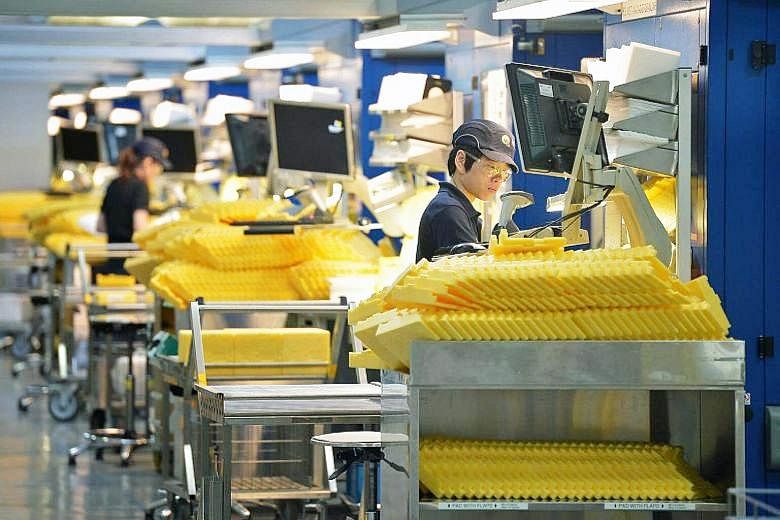Manufacturing in Singapore fell to its lowest level since 2009 last month.
With factories trying to limit their losses from a recession caused by the coronavirus pandemic, a spike in job cuts is a real risk.
The Singapore Purchasing Managers' Index (PMI) declined 3.3 points to 45.4 last month, said the Singapore Institute of Purchasing and Materials Management (SIPMM).
It was the second contraction in a row and the lowest reading since February 2009, when the index was at 45 points, SIPMM said in a statement yesterday.
The electronics sector PMI fell 3.5 points from February to 44.1, which was also the lowest reading since February 2009 and the second month of contraction.
The electronics factory output index slipped to 40.9, its lowest point since December 2008.
The Singapore PMI report comes after advance gross domestic product growth (GDP) estimates showed that the economy may have shrunk 2.2 per cent year on year in the first three months of this year - the biggest contraction since 2009.
The first-quarter slide prompted the Ministry of Trade and Industry to cut its full-year GDP growth forecast to -4.0 to -1.0 per cent, from an earlier downgraded estimate of -0.5 to 1.5 per cent.
SIPMM vice-president for industry engagement and development Sophia Poh said: "The Covid-19 pandemic has greatly impacted the manufacturing sector as companies struggle to contain financial losses from sharp revenue reductions."
The March PMI data for both overall manufacturing and electronics showed faster contractions for key indicators, including new orders, new exports, factory output, employment, and supplier deliveries, SIPMM said.
The indexes of finished goods, imports, input prices and order backlog also shrank.
United Overseas Bank's (UOB) estimates showed that the declines in new exports and employment indexes last month were significantly large when compared with their three-year averages.
"We are particularly surprised and concerned at the rate of falls especially in Singapore's export and employment indexes," said UOB economist Barnabas Gan.
The data is disconcerting given that Singapore's growth prospects are highly reliant on trade, he said.
According to Mr Gan's estimates, total trade accounted for 201 per cent of GDP last year and was the second-largest globally, just behind Hong Kong at 293 per cent.
Singapore's PMI is in line with reports from around the region this week showing almost all purchasing managers' indexes falling further below 50, the dividing line between contraction and expansion.
The Jibun Bank Japan index dropped to 44.8 and South Korea's PMI fell to 44.2, their worst readings since the global financial crisis.
A trough has been reached in China as the Caixin Media and IHS Markit PMI rose to 50.1 last month from 40.3 a month earlier.
However, economists caution this was inevitable as people went back to work after an unprecedented shutdown and that a better reading does not yet signal a firm rebound.
Mr Irvin Seah an economist at DBS Bank, said: "The drop in Singapore doesn't come as a surprise given the drastic declines in regional PMIs.
"The biggest worry is the decline in the employment index. It could well suggest possible trimming of headcounts ahead."
He was however hopeful that the Government's Resilience Package announced last month will help mitigate the fallout on employment.
Singapore unveiled a supplementary budget of about $48 billion last month, in addition to the $6.4 billion stimulus package in Budget 2020, to cushion the economic fallout.
Ms Selena Ling, head of treasury research and strategy at OCBC Bank, said that the anaemic PMI readings clearly bear the scars from the coronavirus pandemic that has disrupted global supply chains and, more importantly, hit global order books hard.
"It is unlikely there will be much respite in the coming months - in fact, given increasing domestic social distancing measures and rapidly rising global infections and fatalities, with the epicentres shifting to US and Europe, the domestic PMIs may continue to slide near-term," she said.
"We may start to see manufacturing job losses pick up as well if the overall economic conditions remain dire and manufacturers ramp up cost-cutting measures," Ms Ling added.



